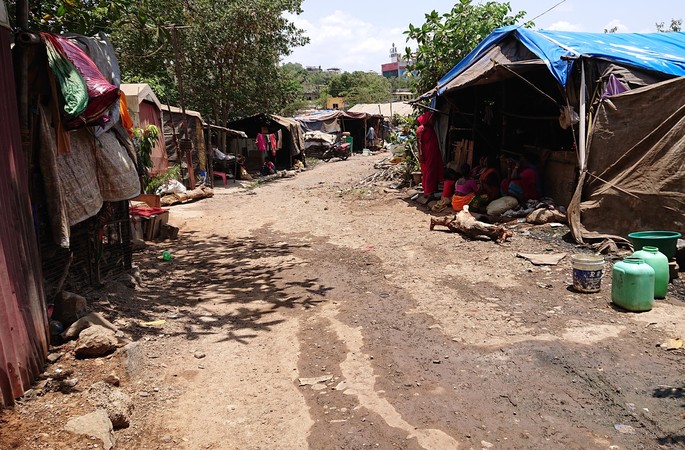Despite forming 15% of India’s population, we nomadic tribes who were anyway far removed from every single development indicator, are now literally fading away. I belong to the Gadiyalohar nomadic community. We can be seen living in small tents on the side of roads, with our rudimentary ironsmith tools. We work with iron, making iron tools and weapons. Communities like ours that used to be commonly seen even 10 years ago travelling from village to village, town to town selling our wares, are now disappearing. With rising industrialisation and commercialisation, even our lowly paying traditional occupations are becoming obsolete. There is not a single question that does not affect us – be that of education, health, sanitation, safety, dignity or identity. For us whose livelihoods depend on our nomadic lifestyle, the COVID pandemic and subsequent lockdown have sounded the death knell.
These communities were the first to lose their independence in India, and are still not free. The nomadic communities’ historical oppression began with their being labelled ‘criminal’ by the British, through the Criminal Tribes Act in 1871, as vindictive punishment for having risen up for Independence. The subsequent violence was immense – economic, social, physical, political and mental; rendering them homeless, resourceless, landless, forcefully displaced. Despite the ‘criminal’ label having been removed in independent India by law (therefore ‘denotified’), the communities still carry the stigma. Mob lynchings, sexual violence, caste atrocities and police abuses are common against them based on unjust and discriminative suspicion. Young men of these tribes are routinely picked up arbitrarily when there is any crime in the area.
Being a young woman from a nomadic / denotified tribe, I would like to take my own example to highlight what this means for a nomadic tribe girl and woman.
I was quite good at studies in school. In class 12, I stood second in my entire college. This was almost impossible for a girl of my background. Despite this, for the want of a mere Rs. 3000, I could not continue to university and had to drop out. In this situation, I lost my father. I was 15 with four younger sisters. Even before, when my girlfriends were dreaming about their careers and futures, my community was planning my marriage. Throughout my childhood, I remember I would spend my days helping my father make iron tools by working the heavy ‘bhata’ – a hand-worked bellow used to create the fire to melt iron. This is the story of all girls in my community. We are either a child or a woman; we never get to live as children when we are young; we are rushed into adulthood. While this was the situation within our communities, there are no resources available for us from outside.
I completed my higher education after years of marriage, as a young mother. I am one of the first and few post-graduate women in my community. When I became the first Gadiyalohar woman to travel outside India to receive an award, everyone congratulated me, but I felt terrible that we had to wait till 2020 to reach this simple achievement.
I don’t know when the next girl from my community will travel abroad. Development for us is moving at a snail’s pace.
A virus that was brought to India from the ‘developed’ world by ‘developed’ people, affected those at the bottom of the pyramid worst, who had never heard about it. This caused a double emergency for us, creating immense mental distress. The first emergency is of the scarcity of primary resources, and the second is the additional calamity of the pandemic. There was widespread starvation within the first week, with loss of even our meagre livelihood in the lockdown in India. Words like starvation are used quite easily; only someone who has faced starvation really knows what it feels like.
Women of these communities, already facing severe malnutrition, anaemia, etc., are staying hungry the most. They are bearing the brunt of the question of how to find food for their families. If women become weak thus, in the coming days, it will affect our economy badly, since almost 75% of our communities’ livelihoods depend on women’s contributions.
Caste atrocities are rising as villagers eye us, stuck outside in tents, with suspicion.
Our women are being abused even if they enter the village to use the toilet. We are living without shelter, sanitation, water in this pandemic, said a desperate community leader when we contacted him.
Relief with the perspective of Mental Justice, Gender Justice and grassroots leadership Anubhuti has reached 2300 families of 16 different NT-DNT communities across 15 Districts of Maharashtra with dry rations, direct bank transfers. We managed this because our core work is Youth Leadership, and we trained youth on the ground to carry out relief operations.
Ground leaders were contacted to find and reach the neediest families.
I am nursing a two months old baby. Therefore I cannot go out on the field much; most people we are reaching don’t even own phones. Therefore, all co-ordination, training, finding and contacting people took place through basic technology like WhatsApp and phone calls.
Special efforts were made to reach pregnant women, single women, persons with a disability, trans persons, COVID+ patients and survivors of caste violence.
With a group of NT-DNT activists, we carried out advocacy with the state government and district collectors to focus on the desperate needs of NT-DNTs. Two collectors responded positively by appointing nodal officers and carrying out surveys for the same.
Advocacy was continued with other human rights campaigns such as ‘Right to Pee’ for dignified and safe sanitation facilities for vulnerable women & girls.
Two videos were made highlighting Grassroot NT-DNT voices.
The only grassroots women-led work reaching NT-DNT communities
In the highly male-dominant culture of these communities, mine is the only NT woman-led work with intersections of gender, caste, disability. This has led to veiled threats from the established male leadership. But I also see a significant change in that the men actually working on the ground, after seeing our work, are supporting and accepting women’s leadership, even standing up to their own leaders. “Many political leaders are in touch with us, but they have not helped in this pandemic. Yours is the only organization that came looking for us with actual help.” – said a community leader.
A ground network of NT-DNT activists has been created, ready to continue the work. “The work I managed to carry out in this lockdown because of your support, has given me the confidence to start working with my community. I will need your mentoring.” – said a young man who coordinated relief on the ground.
It is not possible for these communities to bear any additional calamity. This period will have a historical negative impact on us; everything we had worked for, to reach where we have in the 21st century, has been put to waste.
When I look at the impact of this calamity from the lens of development, this is the first generation of this community who are finishing even primary school. And the economic calamity because of the lockdown will mean that they will drop out even before completing school – especially for girls. This will lead to rising social insecurity, rising economic challenges and child marriages too.
Another issue I foresee is that there will be massive competition in the jobs market, especially the informal sector, once the lockdown is lifted. Women working in these sectors will be affected worse, and in rising desperation, they will be even more vulnerable to sexual exploitation at the workplace.
Anubhuti is, therefore, planning long-term responses that include scholarships for girls, nutrition support to women, medical support, disaster management training to youth and community leaders, training in the implementation of the Prevention of Sexual Harassment Act 2013, etc. We exhort NGOs, individuals and the state and the central government of India to urgently respond to this situation.
“We are the people who make even iron sweat. We are not beggars, we have never asked anything of anyone. We only ask the government now to look into the dire situation created for us nomadic, denotified tribes.” – a Ghisadi grassroots activist.
References:
Sarthak. Study Report: ‘Socio-Economic Status of Women of Denotified & Nomadic Communities in Delhi’. National Commission for Women.
Shantha, S. 16 May 2020. Maharashtra: Three Pardhi Men Killed for Asserting Their Land Rights. The Wire. Accessed at: https://thewire.in/caste/maharashtra-beed-pardhi-men-killed-land-rights
Tiwari, S. May 2020. COVID-19 leaves denotified nomadic tribespeople hungry, indebted. India Spend. Accessed at: https://www.indiaspend.com/covid-19-leaves-denotified-nomadic-tribespeople-
hungry-indebted/



